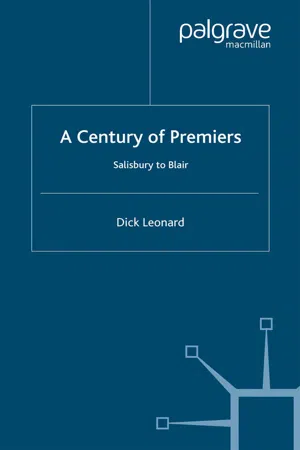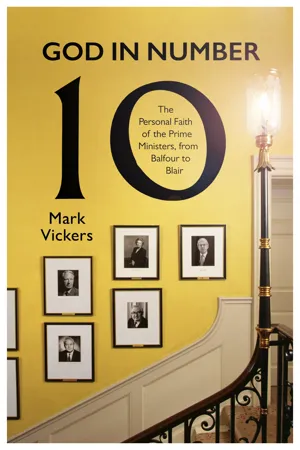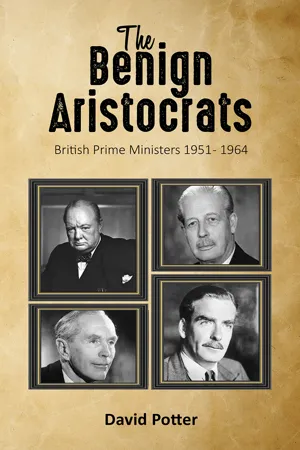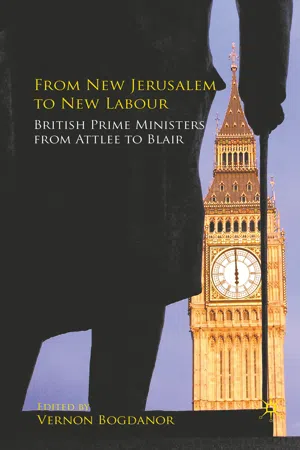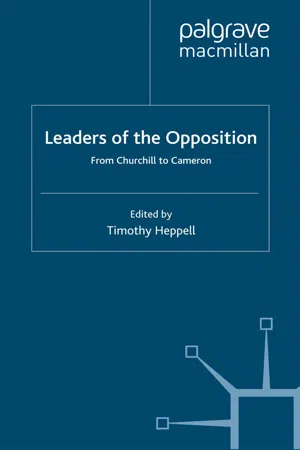History
Alec Douglas-Home
Alec Douglas-Home, also known as Sir Alec Douglas-Home, was a British Conservative politician who served as Prime Minister of the United Kingdom from October 1963 to October 1964. He was known for his efforts to modernize the Conservative Party and for his role in foreign affairs, particularly during the Cold War era. His brief tenure as Prime Minister was marked by efforts to address economic challenges and international relations.
Written by Perlego with AI-assistance
Related key terms
1 of 5
6 Key excerpts on "Alec Douglas-Home"
- eBook - PDF
A Century of Premiers
Salisbury to Blair
- D. Leonard(Author)
- 2015(Publication Date)
- Palgrave Macmillan(Publisher)
CHAPTER 14 Sir Alec Douglas-Home: Right Man, Wrong Century? The 14th Prime Minister of the twentieth century was a 14th Earl, an improbable occurrence and one never likely to be repeated. Alexander Frederick Douglas-Home was born on 2 July 1903, the eldest of seven children of the 13th Earl of Home (pronounced ‘Hume’). He himself was to undergo several name changes, becoming successively Lord 227 Dunglass, Earl of Home, Sir Alec Douglas-Home and, finally, Lord Home of the Hirsel. According to his official biographer, D.R. Thorpe, his ‘upbringing was privileged even by the standards of the upper classes of the time’ (Thorpe 1996). He was descended from two of the most pow- erful and wealthy families in Scotland. The Douglases, famous robber barons, had been the scourge of the English for several centuries; the Homes had betrayed their own countrymen to collaborate with their English oppressors, and, in 1603, the first Earl came down to London with King James I, as one of his most trusted advisers. The Douglas and Home families were united by marriage in 1832, and, when Alec was born, his grandfather, the 12th Earl, owned well over 100,000 acres, with estates in Berwickshire and Lanarkshire – the latter containing valuable coal deposits – as well as several grouse moors, valuable fishing rights over a long stretch of the River Tweed, and castles at Douglas and the Hirsel, near Coldstream. Alec’s family environment was a happy one. His father Charlie– reportedly an exceptionally nice man – was a conventional landowner and part-time banker in Edinburgh. His mother, the former Lady Lilian Lambton, daughter of the Earl of Durham, was a more radical influence. Known teasingly in the family as ‘the well-known socialist’, she was to vote Labour in the 1945 election, even though her son was by then a junior Conservative minister. - eBook - ePub
God In Number 10
The Personal Faith of the Prime Ministers, Balfour to Blair
- Mark Vickers(Author)
- 2022(Publication Date)
- SPCK Publishing(Publisher)
Alec Douglas-Home (1963–1964)
‘A declaration of faith’Alexander Frederick Douglas-Home1 was born at 28 South Street in Mayfair on 2 July 1903. He was educated at Eton and Christ Church, Oxford.Douglas-Home contested Coatbridge and Airdrie as a Scottish Unionist (Conservative) in the 1929 general election, losing to Labour. Elected for Lanark two years later, he held the seat until 1945 and won it back in 1950. On his father’s death on 11 July 1951, he entered the House of Lords as the Fourteenth Earl of Home. Following his appointment as Prime Minister, Douglas-Home disclaimed his peerage and was elected MP for Kinross and West Perthshire at a by-election on 7 November 1963. He represented the constituency until retiring from the Commons at the October 1974 general election.In 1936, the Chancellor of the Exchequer, Neville Chamberlain, appointed Douglas-Home as his Parliamentary Private Secretary. (He had acted in a similar capacity for junior ministers at the Scottish Office and the Ministry of Labour.) He remained with Chamberlain until his resignation as Lord President of the Council in October 1940. Serving Chamberlain loyally, he suffered by association with the policy of appeasement. Tuberculosis of the spine precluded military service during the Second World War.In May 1945, Douglas-Home was appointed Undersecretary at the Foreign Office in Churchill’s caretaker government. In 1951, Churchill made him Minister of State for Scotland. Perceived as conscientious, hard-working and personable, Douglas-Home entered the Cabinet in 1955 as Secretary of State for Commonwealth Relations. His tact and firmness helped preserve Commonwealth unity during the Suez Crisis and disputes over the apartheid regime in South Africa. From 1957, he was also Leader of the House of Lords and Lord President of the Council. - eBook - ePub
The Black Door
Spies, Secret Intelligence and British Prime Ministers
- Richard Aldrich, Rory Cormac(Authors)
- 2016(Publication Date)
- William Collins(Publisher)
10Alec Douglas-Home (1963–1964)
It is very easy to cross the line between a free society and a police state.Alec Douglas-Home1Harold Macmillan, bewildered by events and in failing health, resigned in October 1963. In doing so, he left his successor a legacy of messy intelligence issues to address. This unenviable task fell to Sir Alec Douglas-Home – one of the most decent and honourable prime ministers ever to set foot through the famous black door. Born to a wealthy landed Scottish family, Douglas-Home was the fourteenth Earl of Home, but set aside his peerage to serve in the Commons. A patrician figure, he had been popular at Eton and at Christ Church College, Oxford, where he completed a rather leisurely third-class honours degree in modern history in 1925. His main achievement was as a cricketer, playing for Middlesex and the MCC. If Macmillan had been somewhat Edwardian in his outlook, Douglas-Home seemed positively Victorian – Harold Wilson, leader of the opposition, dismissed the new premier as an ‘elegant anachronism’.2 Yet, once in office, he went about his business with a quiet competence, and was rarely ruffled by events. In power for only 363 days, Douglas-Home was one of Britain’s most effective premiers, although today he is a largely forgotten figure.3Secret service is the least-known aspect of his overlooked premiership. Yet, Douglas-Home believed passionately in intelligence, telling a NATO conference: ‘When we policy-makers fail, as we so often do, it is generally because we have not got enough intelligence or because we have made the wrong use of what we possess.’4 He was well-equipped to oversee secret service, having been a junior minister at the Foreign Office in the last months of the wartime government, and so perhaps qualifies as the last of Winston Churchill’s wartime trainees. He had served as Commonwealth secretary and then foreign secretary under Macmillan, working closely with his deputy, Edward Heath. He was respected for his vast knowledge of world affairs, and later returned to the Foreign Office in the Heath government of 1970. In that role he went on to lead the expulsion of ninety Soviet intelligence officers from London, known as ‘Operation Foot’, advising the prime minister that ‘a stand had to be taken on the scale of Russian spying in Britain’.5 - Available until 14 Jan |Learn more
The Benign Aristocrats
British Prime Ministers 1951 - 1964
- David Potter(Author)
- 2022(Publication Date)
- Austin Macauley Publishers(Publisher)
Chapter SevenAlec Douglas-Home
Alec Douglas-Home had an interesting life. His Premiership was remarkably short (almost exactly one year from October 1963 until October 1964) but his political life consisted of a lot more than that. Unusually, he had a considerable political career after he had demitted the office of Prime Minister, and long before he became Prime Minister, he had been active in diplomatic circles, notably – some say notoriously – associated with Neville Chamberlain at Munich in 1938. He suffered a serious life-threatening illness in the early years of World War II and recovered, he shares with Harold Wilson the distinction of being a Prime Minister to be born and to die in the twentieth century and he remains the only Prime Minister ever to have played First Class Cricket. Many Prime Ministers were interested in (and occasionally obsessed with) cricket – Ramsay MacDonald, Clement Attlee, Harold Wilson, John Major to name a few, but Alec was the only PM to have played the game at a high level.The grandson of the 12th Earl of Home, Alec was born in Mayfair (yes, Mayfair – the most expensive property on the Monopoly board!) in London in 1903, something that meant that he was just too young to serve in the Great War. For that, he should be very thankful. His mother was Lilian Lambton, and her father was an Earl too. His father was called Lord Dunglass, which meant that he was second in line to the next Earl. When his grandfather died in 1918, they both moved up a grade and Alec became Lord Dunglass before in 1951 becoming the 14th Earl. Harold Wilson, Alec’s direct opponent in 1964, had endless fun mocking this nonsense, although Alec did retaliate by saying that Harold could be described as being “the 14th Mr Wilson”.Alec wrote in 1976 a rather refreshing and honest autobiography called “The Way The Wind Blows”. To his eternal credit, he does not try to insult anyone’s intelligence by claiming to be poor and moaning about Lloyd George or Ramsay MacDonald trying to take his money away from him like some latter-day Robin Hood. His aristocratic background, however, (and he was probably one of the richest men ever to become Prime Minister) did mean that there was something of a credibility gap when he was meant to be dealing with issues like urban poverty and child deprivation. This is not to say that he was not a kind and humane man. Indeed the balance of evidence was that he was, and he was certainly well-liked by all who were close to him. The word “snob” might have been applied to him, but wasn’t, at least not very often. He had the misfortune to look snobby, however. - eBook - PDF
From New Jerusalem to New Labour
British Prime Ministers from Attlee to Blair
- V. Bogdanor(Author)
- 2016(Publication Date)
- Palgrave Macmillan(Publisher)
Alec Douglas-Home, 1963–1964 83 three of the great offices of state below the premiership. 13 But the appointment was not the one for which his career will be remembered. He was moving into the political arena where the Prime Minister had acknowledged expertise, and in which he had relatively little experience, apart from his unhappy pre-war spell as Under-Secretary at the time of Munich, a point he acknowledged in his first major speech in the Commons as Foreign Secretary: ‘I know that I shall greatly profit by the Prime Minister’s own experience and great skill as Foreign Secretary in conducting my own duties as Foreign Secretary in succession to him.’ 14 Butler, his spirit crushed by three failures to become Prime Minister, in 1953, when both Churchill and Eden were ill (with hindsight Butler thought this his best opportunity 15 ), 1957 and 1963, was demob-happy, and even more prone to his famous Rabbisms. ‘Mind you, Alec’s a good man, really,’ he would say at meetings. 16 And, when he visited Moscow University on his Russian tour, he amazed his hosts by asking through the interpreter: ‘Is this univer- sity state-aided?’ 17 More seriously, just before the election in October Butler told a reporter that ‘things might start slipping in the last few days,’ adding, inaccurately as it proved, ‘they won’t slip towards us.’ 18 When Home published in retirement what proved a bestselling political memoir, Butler offered it to weekend guests at his home at Stanstead, asking if they would care ‘to look at this book on fishing’. 19 Maudling continued as Chancellor of the Exchequer, and Henry Brooke as Home Secretary. Hailsham was Lord President and later, in addition, in charge of Education and Science. Duncan Sandys, Peter Thorneycroft, Freddie Erroll and Geofrey Rippon were also prominent figures. Two of the key figures were in non-departmental jobs. - eBook - PDF
Leaders of the Opposition
From Churchill to Cameron
- T. Heppell(Author)
- 2012(Publication Date)
- Palgrave Macmillan(Publisher)
68 6 Alec Douglas-Home, 1964–5 Michael Hill Alec Douglas-Home holds two unfortunate British political records: he is the shortest-serving post-war Prime Minister, with just 364 days separating his appointment and his defeat in the 1964 General Election. In addition his tenure as Leader of the Opposition, between October 1964 and July 1965, was even shorter than his spell as Prime Minister and consequently, Douglas-Home also has the dubious distinction of being the shortest-serving Leader of the Opposition of the post-war period, excluding temporary occupants such as George Brown, Margaret Beckett, John Major and Harriet Harman. This short time at the very top of the Conservative Party means that Douglas-Home is largely passed over in literature covering the period, as he is sandwiched between Macmillan’s high-water mark of one-nation Conservatism and Heath’s failed attempts at ideological renewal (Evans and Taylor, 1996: 101–40). This chapter suggests that Douglas-Home’s chances of any degree of success as Leader of the Opposition were undermined not just by the fact that he lost the General Election of October 1964, but also because the Conservative Party remained deeply troubled about the means by which he had acquired the party leadership and premiership in October 1963. In addition the chapter identifies two other dimensions that explained why his tenure was so short. First, his weaknesses in terms of public communi- cation, and second that Douglas-Home showed little personal ambition to withstand the criticism and fight to retain the role. The circumstances around Sir Alec Douglas-Home’s appointment were and indeed still are a matter of controversy and debate: as a consequence his legitimacy and mandate to lead the Conservative Party was always a matter of dispute. This is not the place to go into detail about the war of the Macmillan succession.
Index pages curate the most relevant extracts from our library of academic textbooks. They’ve been created using an in-house natural language model (NLM), each adding context and meaning to key research topics.
